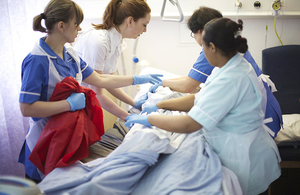New nursing degree apprenticeship
Health Secretary Jeremy Hunt will announce new nursing degree apprenticeship, opening up a career in nursing to more people.

The first apprentice nurses could be working on wards from September, and once established, up to 1,000 apprentice nurses could join the NHS each year.
Aspiring nurses will join the apprenticeship at different stages, depending on their qualifications and experience, and stay in work whilst learning. By offering staff who want to progress more flexibility, regardless of whether they are health care support workers or already working towards higher level qualifications, employers will be able to open up a career in nursing to people from all backgrounds.
Health Secretary Jeremy Hunt is expected to say:
Nurses are the lifeblood of our NHS, but the routes to a nursing degree currently shut out some of the most caring, compassionate staff in our country. I want those who already work with patients to be able to move into the jobs they really want and I know for many, this means becoming a nurse. Not everyone wants to take time off to study full time at university so by creating hundreds of new apprentice nurses, we can help healthcare assistants and others reach their potential as a fully trained nurse.
In a speech at the NHS Providers conference this morning, the Health Secretary will announce the new role as one in a series of measures to help improve the working lives of staff, including:
-
improving working conditions by setting expectations about the use of e-rostering in Trusts, supported by up to £200,000, so Trusts can manage staff rotas and staffing levels on wards and staff can check rotas online and make requests
-
confirming that statutory professional regulation is a necessary requirement for the new nursing associate role and asking the Nursing and Midwifery Council to consider this in the same way that it already does for nurses, and the GMC does for doctors
The new nursing associate role will work alongside healthcare support workers to deliver hands on care, freeing up existing nurses so they can spend more time using their more specialist training to focus on clinical duties and take more of a lead in decisions round a patient’s care. Interest in the role has already seen Health Education England expand the number of training places on the pilot scheme increase from 1,000 to 2,000.
People who complete the nursing associate apprenticeship will be able to count that training towards a nursing degree.
Earlier this year the government committed to creating 100,000 apprenticeships within the NHS by 2020 to ensure it has a workforce with the right support, skills and numbers to provide consistently safe, high quality care 24 hours a day, 7 days a week.
Apprenticeships offer opportunity to thousands of people and are proven to increase the earnings of those who undertake them. A range of roles will be created, from pharmacy services assistants to associate ambulance practitioners, as well as in areas including IT, hospitality and facilities. They are proven to broaden the routes into training and employment in the NHS and improve diversity within the workforce. There are already 20,000 apprentices working in the NHS who make a valuable contribution to service and remain loyal to their employer.
The Health Secretary’s speech is expected to also offer a variety of new measures to improve the working lives of other groups within the NHS by growing the capability of leadership within the NHS, increasing workforce morale and more training for clinicians.
Staff play a vital role in the health service and the government wants to make sure staff have the skills, support and time they need to do their job well. To deliver this, since May 2010, the NHS has employed over 11,900 more doctors and over 9,800 more nurses. Over this Parliament this will make up to a further 11,000 doctors and 40,000 nurses available, as well as creating up to 1,500 more medical student places each year from 2018 in order to help prevent rota gaps.